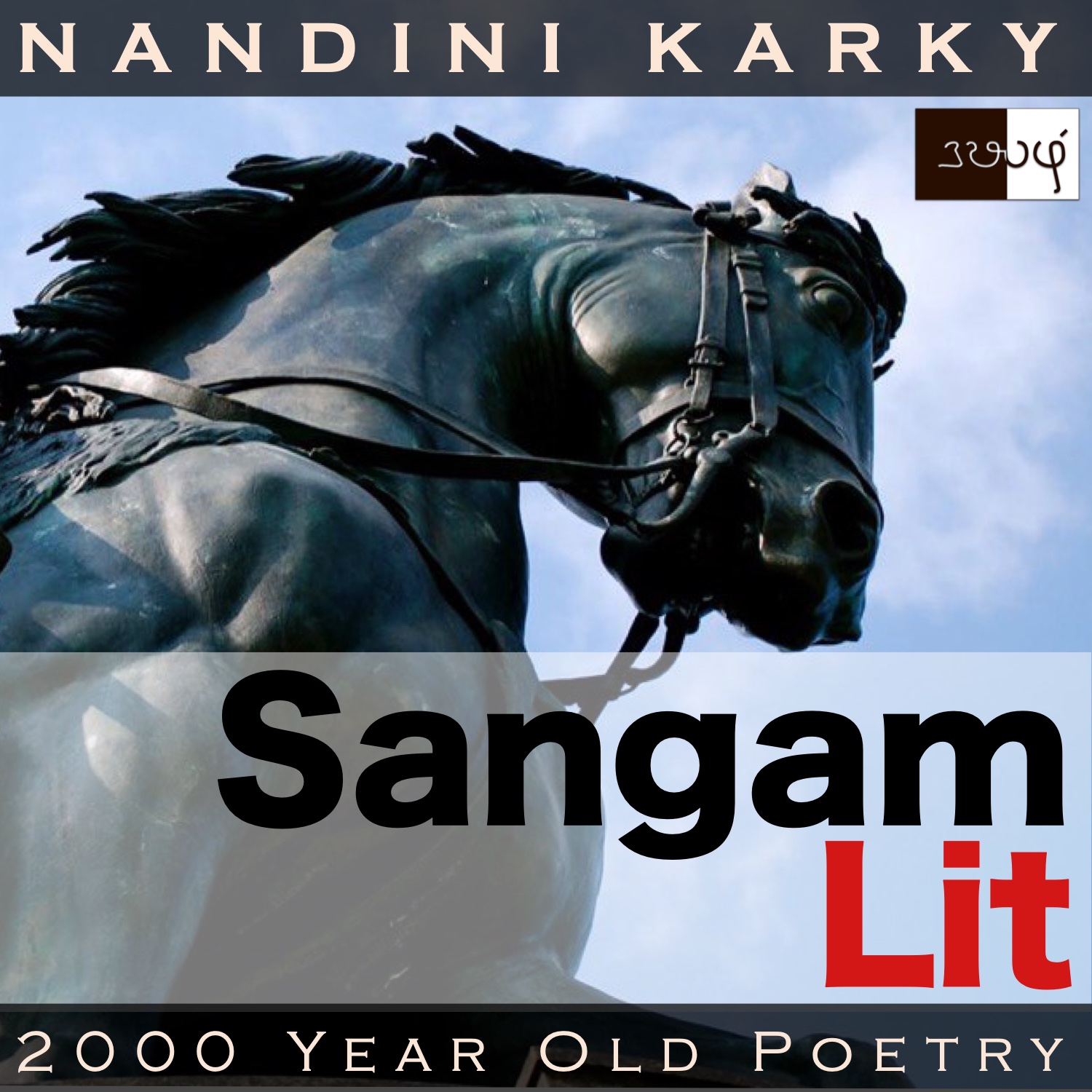Podcast: Play in new window | Download
Subscribe: Apple Podcasts | Spotify | Amazon Music | Android | iHeartRadio | TuneIn | RSS | More

In this episode, we relish the social customs depicted in Sangam Literary work, Natrinai 58, written by Mudhukootranaar. The verse is set in the ‘Neythal’ landscape or the coastal regions and speaks in the voice of the lady’s confidante, as the man speeds away on his horse, after meeting with the lady during the day.
பெருமுது செல்வர் பொன்னுடைப்புதல்வர்
சிறு தோட் கோத்த செவ் அரிப்பறையின்
கண்ணகத்து எழுதிய குரீஇப் போல,
கோல் கொண்டு அலைப்பப் படீஇயர்மாதோ-
வீரை வேண்மான் வெளியன் தித்தன்
முரசு முதல் கொளீஇய மாலை விளக்கின்
வெண் கோடு இயம்ப, நுண் பனி அரும்ப,
கையற வந்த பொழுதொடு மெய் சோர்ந்து,
அவல நெஞ்சினம் பெயர, உயர் திரை
நீடு நீர்ப் பனித் துறைச் சேர்ப்பன்
ஓடு தேர் நுண் நுகம் நுழைந்த மாவே!
A life of luxury unravels as the poem opens with the words ‘பெருமுது செல்வர்’, meaning ‘the wealthy with old money’. After quite some time, we get to meet a historic character in our Sangam travels, ‘Thithan’, referred as ‘வீரை வேண்மான் வெளியன் தித்தன்’. There’s a certain loudness in the lines with descriptions of ‘அரிப்பறை’, ‘a loud drum’ and then ‘முரசு’, the drum used by kingsmen and finally, as if nature does not want to be left out, the roar of high waves in ‘உயர் திரை’. Even as the specific words echo, the overall rhythm of the verse also adds to that resonating beat with elements like ‘செல்வர் – புதல்வர்’, ‘வெண் – நுண்’, ‘இயம்ப – அரும்ப’ as well as rippling cascades of ‘நீடு நீர்’ and ‘நுண் நுகம் நுழைந்த’! Lured by these beats, let’s enter the arena of this verse.
The man arrives to meet with the lady during the day and is preparing to depart as evening approaches. The lady’s confidante asks him to stay and just then, wordlessly he speeds away. At that moment, the lady’s confidante says,“Those sons of the wealthy with old money, who wear gold chains around their necks, carry on their little shoulders, drums to play with. The sparrow painted on these drums is hit with drum sticks again and again, endlessly. Just like that, let the horses, tied to the yoke of the speedy chariot of this lord of the cool shore, surrounded by high seas, be beaten too. Why? Because it’s that time of the day, when ‘Tithan’, the son of king ‘Veliyan’, who rules the city of ‘Veerai’, ordered for lamps to be lit on drums and those lamps send out the sound of white conches, while fine dew buds, all announcing the evening that comes to fatigue our lady’s form and makes her incapacitated as his horses take our lord of the shore away from her!” When the lady’s confidante requests him to stay, that’s a hidden message to make him seek the lady’s hand in marriage as the only way a man could stay the evening was after he had wedded the lady.
Now, let’s try to understand the social practices and get to know the historic character that we glimpsed at. Starting at the beginning, the reference, ‘the wealthy with old money’ seems to set apart the classes amongst the rich in those times. For, the inherent understanding is that people with new money are scared to part away from their wealth and they would never send their children, adorned with jewels, to go play in the backyard. But, the wealthy with old money could be spotted by sighting the children in their household, playing carefree, with gold chains dangling around their necks. Coming to now, one can’t imagine even much older women walking the streets with gold chains galore, let alone little children! It must have been a time of safety and prosperity, for sure! Then, looking closely at these children, we find something hanging from their shoulders. Quite the little musicians they are, they are given loud drums to play with. An even more close-angle shot, reveals that these drums are painted with images of sparrows. The lady’s confidante zooms into not the child, not the drum, but the sparrow painted on the drum, as the child beats it with sticks. Let’s hold that image for a little while.
Greeting our historic Thithan, we find that he’s the king of the town of ‘Veerai’, the son of Veliyan. This family is one among the feudal lords who ruled their own small territories in the times of the three well-known Tamil dynasties – the Cheras, Cholas and Pandyas. The speciality of this Thithan is that to aid those working in the evening at the salt mines, he lit the city with lamps arranged on drums that were used by his kingsmen. There was also the practice of sounding out conches to herald the morning and early evening. This streak of evening lights shining on the drums seemingly evokes the sound of those conches in the air. A sensorial delight to imagine this duet between sight and sound!
Finally, we arrive at the reference to the lord of the shore, who lives surrounded by roaring waves, as he speeds away on a chariot driven by horses. It’s these beasts that our lady’s confidante turns her attention to! She projects that anger, sorrow and disappointment at the man, leaving her lady to suffer in the evening, on the horses that take him away! Returning back to the sparrow painted on the drum that we saw earlier, is it the sparrow that’s struck? Nay, the drum! Likewise, although the confidante turns her anger to the horse that’s racing away, it’s the man she wishes to strike with her words. Stay and make my lady’s day, she seems to say!




Share your thoughts...